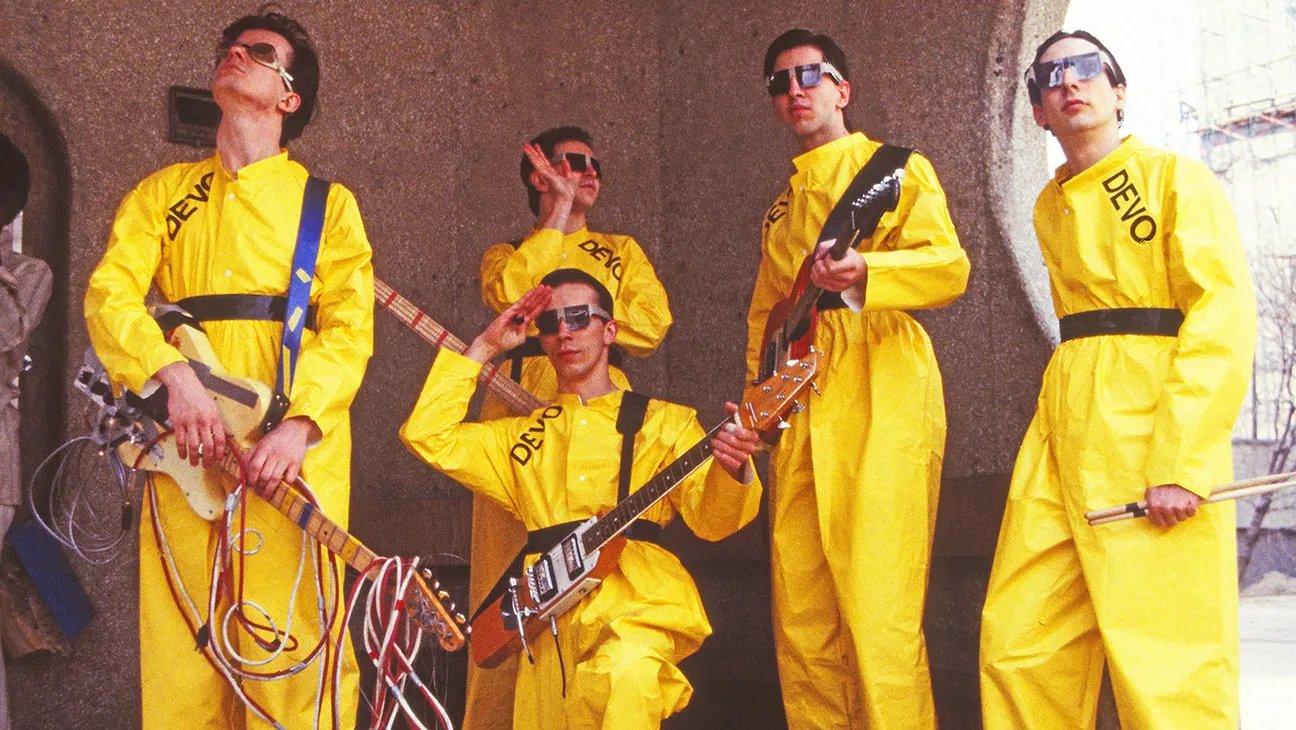DEVO: Rebellion is obsolete.
Rebellion is obsolete.
DEVO founders Mark Mothersbaugh and Gerald Casale came to this realization simultaneously on May 4, 1970, when the National Guard gunned down thirteen of their fellow students at Kent State University. Mothersbaugh and Casale were participants that day in the peaceful student-led rally against President NIxon’s planned expansion of the Vietnam War which resulted in the deaths of four students. The tragedy galvanized nearly four million others in a subsequent student-led strike, the biggest in United States history. It also jolted Mothersbaugh and Casale into radical creative action that would cement them in the cultural zeitgeist for decades to come.
In director Chris Smith’s blitzy kitsch-soaked documentary, DEVO, Mothersbaugh and Casale give an oral history of the experimental music project’s suburban origins, their wacky audio-visual antics on the punk circuit, and their brief, but explosive time as one of the most famous bands in the world. The film is breezy and kinetic, weaving together a chronological timeline of the band’s development with rapid-fire clips of their extensive archival footage and scenes of mid-century middle-class American pastiche—the target of Devo’s pointed critiques.
Music documentaries can sometimes feel like extended Wikipedia entries for a band. Still, the film manages to avoid heavy-handed narration by focusing on the specific context of the band and their philosophy as opposed to the story of their rise and fall. The film itself feels much like Devo’s body of work, a colorful mash-up of high and low-brow culture careening full force into one another again and again.
As Mothersbaugh tells it, Devo came into existence less as a group of musicians and more as a politically conscious art movement where he and Casdale could express their anti-war and anti-capitalist sentiments through experimental performance art. Dressed in monkey costumes and putting dwindling audiences through sonic endurance tests such as the infamous “migraine solo,” Devo found their guiding philosophy in spreading the message of ‘de-evolution’, or the belief that mankind was on a destructive path of regression.
Disillusioned by political helplessness and the hypnotic, subdued nature of conservative monoculture so prevalent in Akron, Ohio where the band’s founding members toiled away in creative isolation, Devo’s radical experimentation started taking shape through short films, music, and various visual mediums. With the help of technical prowess from Mothersbaugh’s brother, Bob, the group focused on music as the medium for their message with early analog synths and tinkered guitars as their tools.
After nearly five years of creative gestation, Devo emerged for their first official tour in 1977 as a fully-formed creative unit, men from an alternate reality in matching hazmat suits here to deliver a message: rebellion is obsolete. The world can no longer be changed by typical means like anti-war rallies and rock and roll. The entire system must be dismantled from the inside out.
The film benefits from Devo’s prophetic interest in combining music with video years before MTV brought the concept to our cultural consciousness. The band seemingly spent as much time creating experimental videos as they did music to illustrate their dystopian ideology. By utilizing these extensive narrative video experiments instead of visually repetitive archival concert footage and interviews, director Chris Smith differentiates his film and avoids the visual sameness that many other music documentaries tend to suffer from.
Radical, campy, and doused in irony, Devo’s multi-genre experiments tell tales of corporate executives puppeteering music artists for their own gain and a dying world rotting from within thanks to us cultureless apes bound for destruction. Their sardonic narratives are eerily predictive of our doom-obsessed media-centric era and the corporate takeover of the music industry by megaliths like Apple and Spotify. Much of Devo’s commercial success is attributed to these videos and the heavy play they received during MTV’s launch as few other bands had yet to invest in any visual mediums.
Tracing Devo’s oddball journey from getting booed off-stage in Akron dive bars to recording their first album with David Bowie and Brian Eno out in the German countryside and the eventual meteoric and quite unexplainable success of their best-known song, “Whip It”, director Chris Smith skims past Devo’s '90s hiatus and keeps the focus on the legacy of these self-identified punk scientists.
Screened on May 4, 2024, fifty-four years to the day after the Kent State Massacre, and amongst days of police raids on peaceful pro-Palestinian campus encampments, it’s undeniable that Devo’s message is still reverberating outward. The film’s commitment to that message, as opposed to a reductive biography of the band, makes this a worthwhile re-consideration of Devo as far more than just a one-hit-wonder.
If you enjoyed this article, please consider becoming a patron of Hyperreal Film Journal for as low as $3 a month!



Jess Buie is an artist, writer, and Texan, in no particular order. Find her at @_____buie for giant dog pics. www.jessicabuie.com